Did you know that cannabis businesses can only deduct a fraction of their expenses on taxes? It’s true – thanks to a tax code provision called IRC 280E, normal business write-offs are mostly off the table.
Understanding IRC 280E
IRC 280E is the biggest challenge to the cannabis industry’s financial well-being.
Under this stringent tax rule, cannabis companies are unable to deduct typical business expenses, including rent, office expenses, payroll, marketing costs, utilities, and other similar expenses. If it seems unfair, it certainly is – especially since it’s directly related to cannabis’s legal status at the federal level.
Currently, the feds and the FDA view cannabis as a Schedule I controlled substance, forcing the industry to endure tax laws that were initially meant to target the illicit drug trade and to prevent drug traffickers from claiming deductions related to criminal activities.
As cannabis is legal for adult or medical use in most states, this lingering holdover from the War on Drugs era seems a bit harsh. It puts compliant cannabis businesses in a challenging financial position. Deductions they ordinarily could take are disallowed–falsely inflating taxable income, increasing the tax owed, and significantly shrinking profit margins.
Until the federal government approves FDA rescheduling, 280E will continue to pose a threat to profitability. Knowing what you can and can’t deduct under this rule may help to ease the burden at tax time.
What Cannabis Businesses Can Deduct
Cannabis companies are allowed to deduct only costs directly related to production. These are the costs incurred to produce or acquire the cannabis product itself.
Deductible COGS-related expenses may include:
- Cultivation materials like seeds, clones, soil, nutrients, and grow mediums
- Labor directly related to cultivation, processing, and packaging
- Lab testing fees for product compliance
- Packaging materials used for inventory
- Repairs and maintenance for production equipment
- Salaries for production employees, lab technicians, and quality control staff
- Utilities used exclusively in production areas (e.g., grow rooms, inventory storage)
For example, businesses potentially can deduct electricity costs, transportation, shipping inventory, and security costs, provided they are directly related to inventory. So, while you can’t deduct office or storefront utilities or rental, you can deduct storage and related utility costs for inventory.
Cultivators and manufacturers tend to have the most allowable deductions, as almost all expenses are related to producing the product. Anything that can be capitalized into the cost of goods sold is deductible. While there’s a bit of a loophole here, it’s a slippery slope that requires meticulous record-keeping to segregate COGS-related expenses from operating expenses.
Deducting Equipment Expenses as COGS
Equipment expenses can be deducted if they are directly tied to production. Businesses must document how the equipment supports the production process to qualify under COGS.
There is a distinct difference between capital equipment and operational equipment from a taxation standpoint. Not all equipment is treated equally for tax purposes under 280E.
Capital equipment refers to large-scale machinery and systems. These items are considered assets, require significant investment, and will depreciate over time. IRC 280E allows businesses to recover depreciation costs for eligible equipment and machinery.
Examples of capital equipment include:
- Extraction machines
- Industrial grow lights
- HVAC systems for indoor cultivation facilities
- Industrial irrigation systems
- Commercial-grade packaging systems
- Automated and manual trimming machines
Additional equipment that is eligible to be deducted under COGS include:
- Drying and curing equipment
- Pre-and post-processing machinery
- Lab equipment
Examples of operational equipment include (deductible if production-related):
- Small hand tools (used for harvesting)
- Small-scale packaging systems
- Testing devices
- Quality control devices
- Personal protective equipment (PPE) for employees of cultivation and processing facilities
For vertically integrated operations, such as companies that produce, process, and sell their own products, it may be wise to consider separating the production and distribution aspects of the business from dispensary and logistics operations to maximize allowable deductions.
What Cannabis Companies Can’t Deduct Under IRC 280E
Most business expenses considered “typical” by other industry standards are not deductible under 280E restrictions. Bottom line–if an expense is not related to COGS, you can’t deduct it.
Here’s a shortlist of non-deductible expenses under 280E:
- Office equipment and supplies
- Point of sale systems
- Security systems for non-inventory areas
- Legal fees
- General employee salaries (e.g., marketing, admin, retail staff)
- Administrative costs
- Rental or real estate costs not directly related to production
- Utilities not associated with production
- Online services and software subscriptions
- Sales commission and marketing expenses
What Cannabis Operators Need to Know
What is and is not allowable under 280E is a complex game best overseen by a qualified cannabis accountant, controller, or CFO. These professionals make it their business to stay current on legislation and can advise you on deductions and ways to optimize your strategy.
Cannabis operators will do well to focus on keeping their books in order, prioritizing meticulous documentation of all expenses and how they relate to COGS.
Allocating deductions can be complicated, especially when an expense is only partially attributable to COGS. Be sure to document these splits accurately and be prepared to substantiate your decision.


